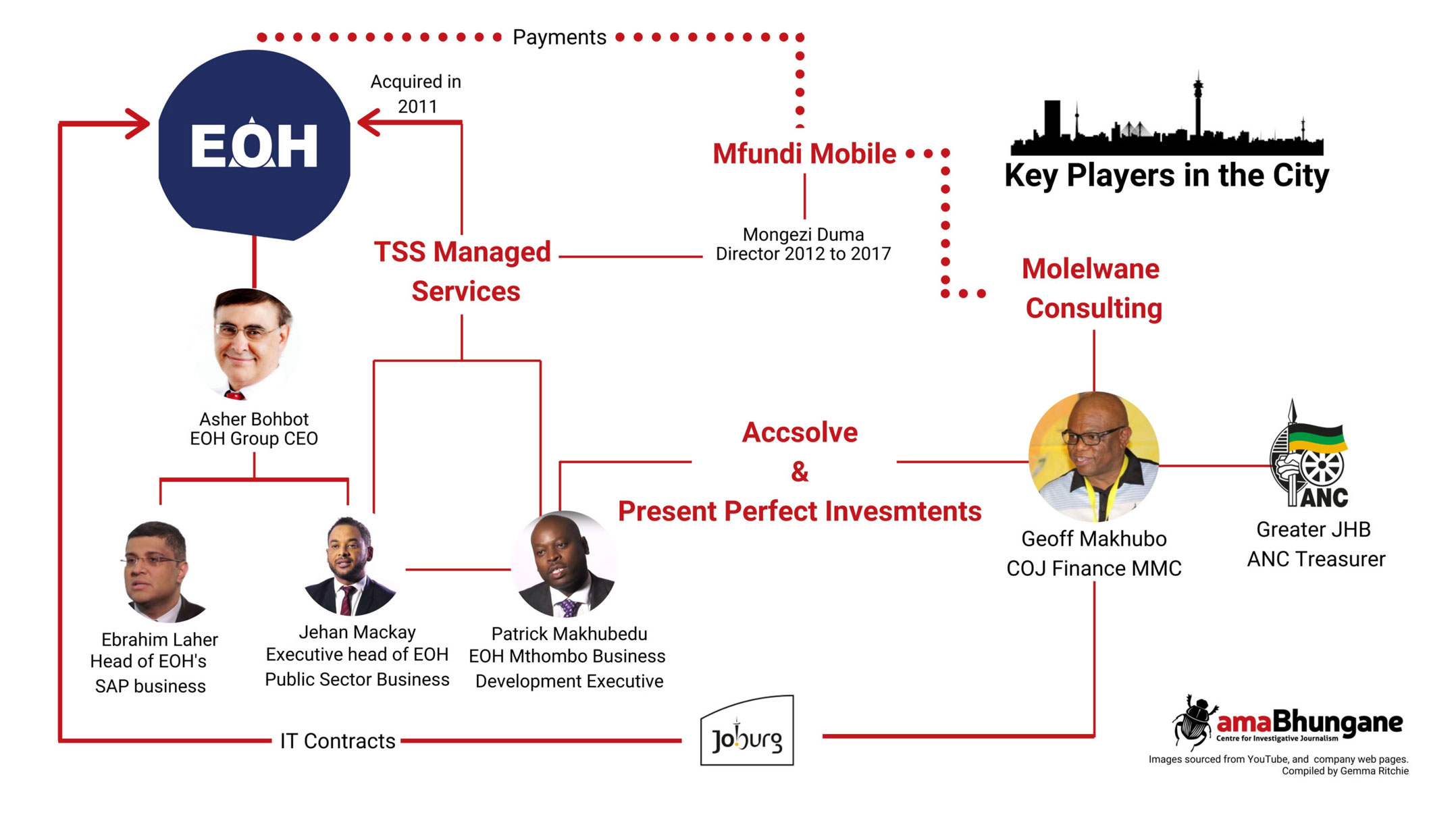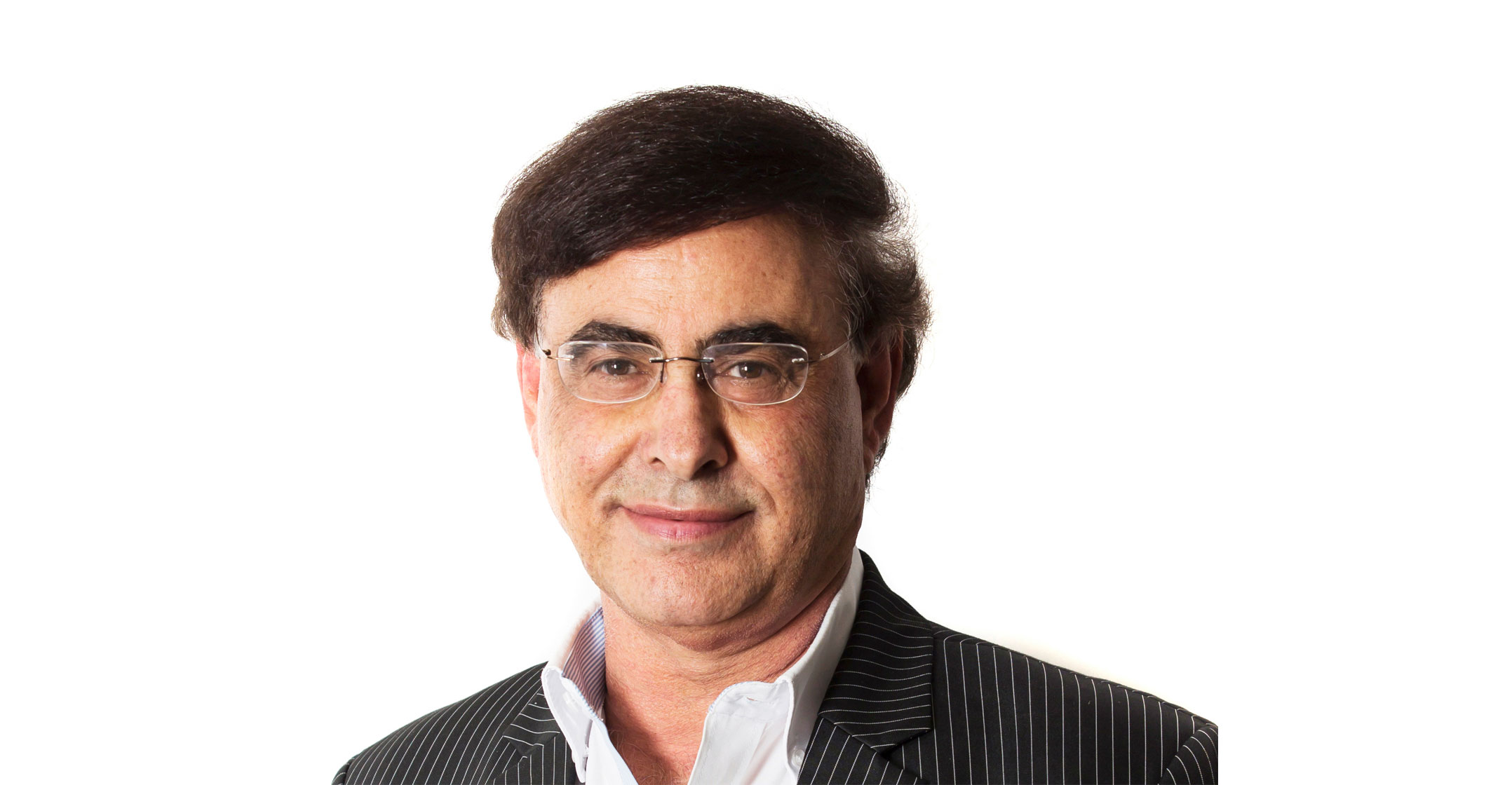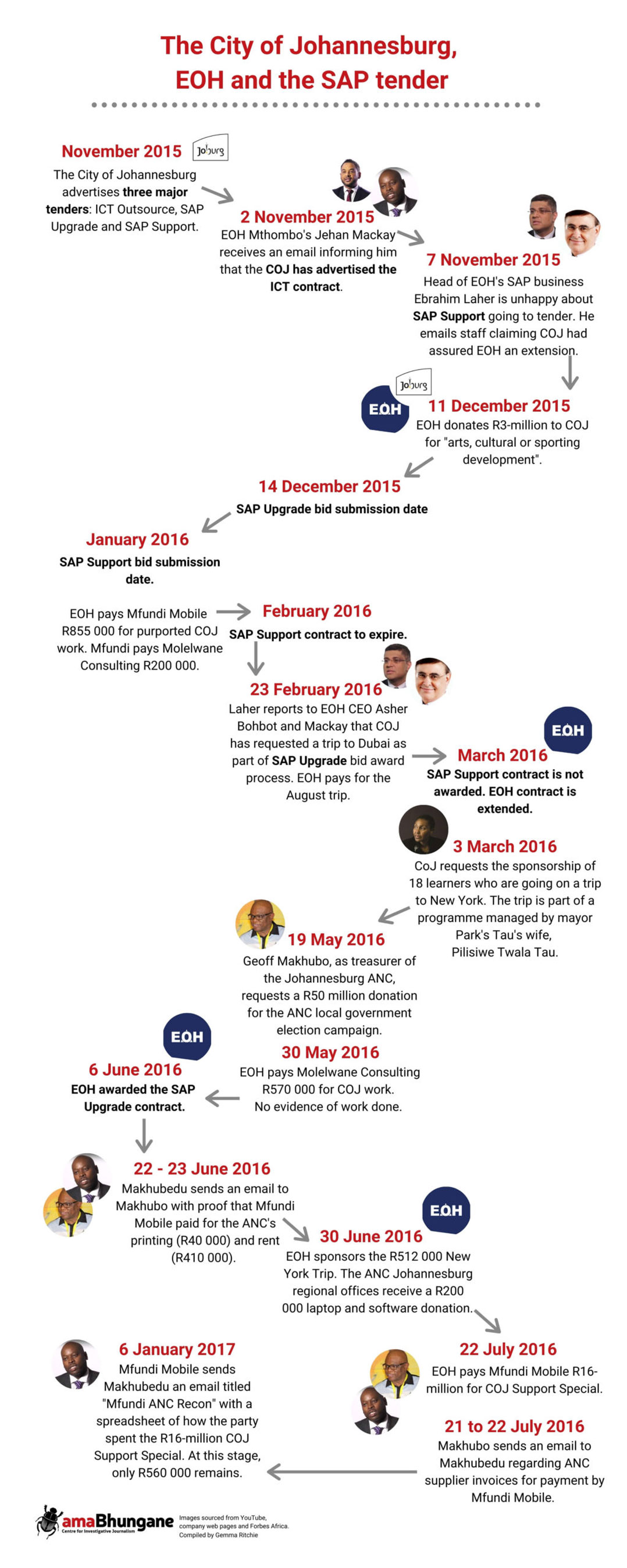 Suspicious payments, including a disguised donation, flowed to a company owned by Johannesburg mayor Geoff Makhubo and to the ANC in the months directly before and after JSE-listed technology company EOH landed major contracts with the city.
Suspicious payments, including a disguised donation, flowed to a company owned by Johannesburg mayor Geoff Makhubo and to the ANC in the months directly before and after JSE-listed technology company EOH landed major contracts with the city.
Makhubo was the treasurer-general for the ANC’s greater Johannesburg region and the city’s finance MMC at the time when these events took place between 2014 and 2016.
Also read: ANC heavyweights fingered in EOH corruption storm
These allegations emerged in testimony at the Zondo commission today after EOH was summonsed to provide information on transactions between it and entities linked to Makhubo and EOH’s former business development executive, Patrick Makhubedu.
Submissions from EOH CEO Stephen van Coller and Steven Powell, the head of law firm ENS’s forensic department, made public how an apparent front company was used as a vehicle allegedly to channel money for ANC’s benefit and to Makhubo’s company Molelwane Consulting.
ENS was contracted by EOH to help it clean house after a change in management.
The alleged front company, Mfundi Mobile, was paid by EOH purportedly for work done on City of Johannesburg projects, but ENS’s forensic investigation “has not found evidence of work done by Mfundi Mobile in exchange for these payments”, Powell said in his submission to the commission.
Wrongdoing
In 2019, Powell led an investigation into EOH’s large public sector contracts that were concluded between 2014 to 2017, uncovering evidence of governance failings and wrongdoing involving a small group of executives in the IT company’s public sector arm.
While the transactions between the entities linked to Makhubo and Makhubedu were not the central focus of the initial investigation, they reveal a pattern similar to the broad findings summarised by Van Coller as evidence of “unsubstantiated payments, suspected tender irregularities and other suspected unethical business dealings”.
The ENS investigation largely focused on two major IT contracts at the City of Johannesburg. Both, awarded in 2016, were to implement SAP software.
The first, an SAP support contract, was advertised in November 2015, but in March 2016 the tender was withdrawn and EOH’s long-running existing contract was extended for another R64-million.
 The second, far bigger contract was for an SAP upgrade. The R404-million contract was awarded to EOH in June 2016, just two months before the local government elections.
The second, far bigger contract was for an SAP upgrade. The R404-million contract was awarded to EOH in June 2016, just two months before the local government elections.
The ENS investigation identified suspicious payments made both before and after these contracts were awarded: Some went directly to the ANC; others to Makhubo’s Molelwane Consulting and some to shadowy “enterprise development” partners who apparently did no work to justify their fees. The rest were channelled to an apparent front company, controlled by EOH employees, who allegedly used the money to pay the ANC’s bills.
ENS also identified a similar pattern with a R109-million network and security infrastructure upgrade, which the city awarded to EOH subsidiary TSS Managed Services in 2014.
E-mails show that a month before the contract was awarded, Makhubo asked EOH for a donation of “at least” R6.18-million for the ANC. A week after the contract was awarded, Makhubo asked for another donation of “at least” R2.5-million for the ANC.
It is not clear whether these amounts were paid in full; the investigators identified over R2-million in payments that TSS made to the ANC during this two-month period.
Powell testified on Wednesday: “We advise our clients that during any bid adjudication, even if it’s an unsolicited bid, you shouldn’t be making any donations, you shouldn’t provide anything of value.
“But what we’ve seen is almost a pattern of regular solicitation of donations coupled to the awards of these tenders. It’s almost as if the tenders are being granted in exchange for financial benefit to the party.”
Buying spree
To understand how EOH got to where it is, you have to consider its growth story. To become the largest technology service provider in Africa, EOH went on a buying spree.
In a 2019 interview on Radio 702, Van Coller said EOH was averaging 30 acquisitions a year in the last five years which made integrating the sprawling business and developing the requisite controls over payments and contracting near impossible. “It started fraying at the edges,” he said.
One such company was TSS, which EOH acquired in 2011 as part of its bid to increase its presence in the public sector. The firm’s management – including co-founder Jehan Mackay, Makhubedu and financial director Rene Bredenkamp – were transferred to EOH’s public sector division, EOH Mthombo, where they were given executive positions.

A fourth EOH executive who features large is Ebrahim Laher, who was chief executive of EOH International and headed its SAP business.
Powell also imputed at least some knowledge to former EOH CEO Asher Bohbot, who allegedly received several e-mails from Laher regarding the City of Johannesburg contracts.
None of these executives is with EOH anymore. It is important to note that their version, which may contradict Powell’s, has not been heard yet. Makhubo is set to testify on Friday.
According to Powell, Bohbot received an e-mail from a seemingly irritated Laher on the morning of 7 November 2015, titled, “COJ – Support contract going out on tender”.
The city’s SAP support services contract was up for renewal in 2016. EOH, the incumbent, had provided this service to the city since 2010 when its subsidiary EOH Mthombo was initially awarded the deal.
The city was going ahead with advertising, “this despite their assurance that they would rather extend our contract”, Laher complained.
That was not EOH’s only concern. The IT company also had its eyes on getting at least one of two other contracts, for ICT outsourcing and SAP upgrades, whose tenders the city would advertise in the same month.
In a separate e-mail to Bohbot, Laher referred to having a “full political and technical strategy for this”.
Key cog
Powell’s investigation suggests that Makhubo was to be a key cog in this technical-political plan, which landed EOH both the R64-million extension on the SAP support contract and the R404-million SAP upgrade contract.
A seemingly telling e-mail is one sent to EOH’s Mackay on 2 November 2015 by a colleague regarding the outsourced ICT services tender being advertised. The colleague tells Mackay that she has “also notified Mr Makhubedu because of Geoff’s influence”. The e-mail suggests that even though Makhubo was an MMC, and was not supposed to interfere with the city’s procurement, EOH believed he was their key to securing them.
But the full picture is not known. Powell told the commission: “It appears Makhubo and Makhubedu mostly communicated on Gmail. Only some of these e-mails were forwarded to the EOH server. We thus only have a partial view of communications between these individuals and entities related to them.”

Makhubedu and Mackay were copied in Laher’s initial November e-mail about the city’s plan to advertise EOH’s support contract. They would also play an active role in the next month’s discussions and transactions related to all three city contracts.
One such instance is an e-mail where Mackay says EOH must commit a percentage of its work and revenue to the city’s jozi@work programme and specify how many small businesses would benefit from the contract, as this was a critical tender requirement.
At the end, Mackay tells Makhubedu and Laher that they needed urgently to allocate a figure for “goodwill ;), to the organisation”. The context suggests he is referring to the ANC.
The jozi@work programme was scrapped in 2017 by then Democratic Alliance Johannesburg mayor Herman Mashaba, who said rather than creating opportunities for residents, the programme was a source of patronage for members of the ANC.
More e-mail evidence referring to tender requirements for the SAP upgrade tender show that Makhubo may have engaged with Makhubedu and Laher about the contract before and after the deadline submission date.
Election money
Indeed, as EOH executives were scrambling to secure the city’s tenders, the ANC was trying to maintain its foothold in the upcoming 2016 local government elections and this required money.
On 19 May 2016, Makhubo, writing as the treasurer of the ANC’s greater Johannesburg region, requested a R50-million donation in an e-mail addressed to Bohbot. Makhubo wrote: “As you are probably aware we have 12 weeks to elections and the costs are escalating.”
At the time, the SAP upgrade contract was still out on tender at the city, where Makhubo’s other hat was MMC for finance.
Five days later, Makhubo sent a follow-up, this time addressed to Makhubedu, Mackay and Laher, reminding them that the request was a “sequel” to meetings that they had.
Article continues below…

“I have communicated our agreements to the ANC leadership especially the regional office bearers and province. I have also committed expenditure to ensure that we get renewal of our mandate of transforming Joburg. This I have done because of the positive experience I have with you…
“Please please come to the party as we are relying on you,” said Makhubo.
Instead of donating directly to the ANC, EOH’s records show that it made, in Powell’s words, a “disguised donation” of R16-million (before VAT) to an entity called Mfundi Mobile, which ENS’s investigators “reasonably suspect” was used as a vehicle to channel money to the ANC.
The transaction has been reported to the Hawks for suspected corruption.
ENS could not determine who owned Mfundi, but its evidence suggests Makhubedu held sway over it. He regularly received invoices from Makhubo, which he forwarded to Mfundi for payment.
Closing the circle, he also ensured Mfundi was paid by EOH. During July, a month after EOH was awarded the city’s SAP upgrade contract, Makhubedu emailed Mfundi invoices totalling R16-million to Laher.
The invoices described Mfundi’s work as “COJ – SAP Support Special” and were approved for payment by Mackay and Bredenkamp.
ENS, however, “found no evidence or details of work done for the generation of these invoices”.
Cover
“From e-mail data it appears Mfundi Mobile did not pay the R16-million directly to the ANC. Instead, the parties used Mfundi Mobile to cover ANC expenses by paying ANC suppliers and services directly, drawing down on the R16-million over time,” Powell said.
Immediately after the EOH payment landed in Mfundi’s account, Makhubo forwarded several invoices for expenses such as printing and bus hire allegedly incurred by the party. In just two days Makhubo had e-mailed invoices worth R4.1-million to Makhubedu, who then passed them on to Mfundi to settle.
By January 2017, the party had used up R15.4-million. A Mfundi employee sent Makhubedu an e-mail titled “Mfundi ANC Recon”, attaching a spreadsheet with a reconciliation of ANC expenses paid for from the R16-million.

The ENS investigation also found earlier suspect payments from EOH to Mfundi over and above the “ANC” R16-million.
Powell said: “Excluding the R16-million paid in July 2016, Mfundi Mobile was paid approximately R15.6-million (ex VAT) over the period 14 January 2014 to 9 February 2016 for COJ-related work. Payments varied but were made in relatively regular increments of at least R406 000/month but we found no evidence or details of work done by Mfundi Mobile for EOH.”
In June 2016, before the R16-million landed, Mfundi also paid ANC office rent of R418 000 and printing costs of R40 000 at Makhubo’s request, according to Powell.
More damning for the current Jo’burg mayor is evidence suggesting his own company, Molelwane Consulting, received well over R3-million in payments from EOH-linked entities between 2012 and 2016.
According to his city declarations of interests, Makhubo owned a 67% stake in Molelwane until at least 2017/2018.
The payments to Molelwane listed by Powell included R570 000 on 30 May 2016, when the city’s SAP upgrade tender was still in play. This payment was described in an internal EOH email as being for ‘ED for City of Joburg’ .
Powell said: “We understand ‘ED’ in this context to mean enterprise development… This payment to Molelwane coincides with other suspect payments which may be linked to a City of Joburg (‘COJ’) contract.
“We have found no evidence of work done by Molelwane in exchange for the R570k payment. Nor have we found evidence of work done by Molelwane for any EOH company on any other project.”
He said EOH’s earlier records of actual payments to Molelwane were limited, but global sums were reflected on the EOH Group B-BBEE supplier list prepared for the periods 2012, 2014 and 2015.
Will have to explain
They reflected EOH group payments to Molelwane totalling R2.72-million (excluding VAT and including the 30 May payment) and suspected third-party payments (mainly from Mfundi) to Molelwane totalling R527 866.90.
The mayor will have to explain what these were for.
In 2018, an amaBhungane investigation uncovered roughly R30-million in payments to Molelwane, siphoned from a City of Johannesburg contract with Regiments Capital, a financial services company deeply implicated in state capture.
In response, Makhubo claimed he resigned from Molelwane when he became MMC in 2011, in order to avoid a conflict of interest. Company records show that, in fact, he only resigned in late 2019, at which time he left his mother as the sole member of the company.
In total, ENS identified R68.4-million (excluding VAT) in “suspect payments” related to City of Johannesburg contracts “where the evidence suggests no work was done”.
Almost half is made up of the payments that EOH made to Mfundi Mobile and Molelwane. But investigators also identified another eight companies that received payments.
ENS investigators also flagged several international trips, seemingly paid for by EOH.
The apparent modus operandi ENS identified in a number of irregular tenders indicates that a group of EOH officials under Mackay would collude with officials to irregularly extend or get sensitive information on tenders before they were advertised, Powell testified on Wednesday.
“When things go wrong for this group of people and it looks like things are not getting their way with the public entity then they would use politically exposed persons to exert influence on the decision makers to ensure that they are not getting their way.” — With additional reporting by Susan Comrie, (c) 2020 amaBhungane
- This article is republished on TechCentral with the kind permission of amaBhungane. For more of amaBhungane’s investigative journalism, please visit amabhungane.org and consider becoming an amaB supporter




